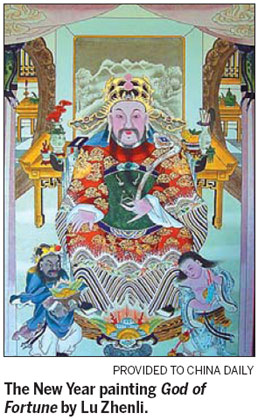
Before Gaomi became famous as the hometown and setting of the books by Nobel Prize-winning author Mo Yan, the agrarian community was already known for master Lunar New Year painter Lu Zhenli.

The 60-year-old is a sixth generation master of the "flapping-ash" style and has been in the business for four decades. He incorporates techniques from various local schools and has been designated as a national-level intangible culture inheritor.
The "flapping-ash" style has been a signature of Gaomi for more than three centuries. It uses willow twigs burned to charcoal to draw the drafts. Charcoal is a difficult medium to work with because it smudges easily.
But Lu says the secret to keeping the lines crisp is to keep them narrow and retrace them up to eight times.
"This kind of work is very rare, even for workshops," Lu says.
Chinese National Academy of Arts researcher Wang Haixia says: "Lu makes the paintings in the traditional way, which is time-consuming and fastidious. To see his works is to see the authentic elaborate paintings."
The academy has selected Lu's works to represent folk drawing in its digital repertoire. The paintings have also been selected for the National Library of China's exhibition of the best Lunar New Year paintings.
"If you draw, you must do it well," Lu says. "That's the most important lesson my father taught me. It has remained my motto through the years."
His father, Lu Qingxi, still paints at age 87 and says he'd feel "out of sorts" if he stopped. He didn't teach Lu specific skills but, rather, helped him develop his aesthetic taste.
"I grew up with great New Year paintings and just know what's good," the son says.
|
|
Lu received formal training in the more scholarly landscape painting.
For 10 years, the teenager painted flowers, birds, mountains and lakes.
"I knew I could create good Lunar New Year paintings if I got the fundamentals right," he recalls.
He spent the following decade imitating great masters' New Year paintings. By the 1980s, he was earning his living from the craft - albeit a meager one.
Since New Year paintings are traditionally more functional than aesthetic - they're posted on doors to repel evil and attract blessings - Lu's costly drawings weren't popular among ordinary wage earners, at 10 yuan ($1.60) in the '80s.
His daughter Lu Hongxia remembers "the hard times" when her father held a kerosene lamp and painted on rice paper late into every night.
"My father taught me that if you draw, you must do it well," the daughter says.
Lu Zhenli moonlighted in a photo booth. "I soon found I'd never be a good cameraman," Lu says.
|
|
"But the elderly villagers, who've seen great works from the past, would say: 'That boy can draw!' That was the greatest compliment."
Lu's best works portray traditional family reunions. These paintings are incorporated into religious ceremonies in the countryside. They're extremely detailed, so Lu spends about four months on each.
Wu's working method begins with him ceremoniously washing to show reverence for his craft. He meditates to achieve a peaceful state of mind and then closes himself up in his studio for hours on end.
"When I finish a really good painting, I just want to strum the jinghu (a traditional instrument), sing Maoqiang Opera and sip local rice liquor," he says.
His traditional family reunion paintings sell for more than 30,000 yuan ($4,800), and he sells out months before Lunar New Year.
His daughter, Lu Hongxia, manages an art shop on Gaomi's antiques street.
Mo Yan is a fan of Lu's works. One of Lu's scrolls adorns Mo Yan's home.
Lu's latest ambition is to teach his trade. "Being a national heritage inheritor makes me realize I have a responsibility to deliver this art to people outside my circle," he says.